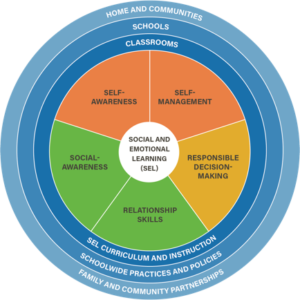 We are living in remarkable times. In July of 2020, in the middle of the Covid pandemic, CASEL released what they called an SEL (Social Emotional Learning) roadmap for reopening schools. In collaboration with forty other organizations, CASEL addressed the challenges that schools were facing as they looked to reopen this past fall. Among these pressures were:
We are living in remarkable times. In July of 2020, in the middle of the Covid pandemic, CASEL released what they called an SEL (Social Emotional Learning) roadmap for reopening schools. In collaboration with forty other organizations, CASEL addressed the challenges that schools were facing as they looked to reopen this past fall. Among these pressures were:
- school closures
- COVID-19
- impending economic crisis
- “persistent, pernicious racial inequities exacerbated by the pandemic and amplified by the nationwide mobilization for racial justice reflected in the Black Lives Matter movement.”
In response CASEL published Reunite, Renew and Thrive outlining four critical SEL practices. Now, more than six months later, we have the opportunity to reflect on these critical practices, what we’ve learned and reassess what we are doing to meet these challenges.
Since the start of the school year, educators have once again shown how resilient they can be in the face of uncertainty. As we think about what’s next for ourselves and our students, we can use the four critical SEL practices to ask ourselves how we are doing and what we might want to do differently as we move forward.
SEL Critical Practice 1
Take time to cultivate and deepen relationships, build partnerships and plan for SEL. As a huge fan of backward design, I would suggest starting Supporting relationship building might look like meaningful connection practices at the beginning of staff meetings such as connection circles.
We might ask ourselves the following questions:
- What relationships still need work?
- How can I continue to build relationships at this point in the year?
- Who else needs to be invited so that we have more diverse voices in the conversation?
- How might we build coalitions that effectively plan and support learning for all students?
SEL Critical Practice 2
Design opportunities where adults can connect, heal and build their capacity to support students. One school outside of Colorado Springs has been working with a local mindfulness consultant since the beginning of the school year to bring weekly mindfulness training, including emotional intelligence and trauma informed practices, to their teachers. This work is part of a larger school wide plan to support SEL for adults and students.
Helpful questions might be:
- How do we help adults feel connected, empowered, and valued?
- How might we continue to cultivate self-care and wellbeing for adults?
- What ongoing professional learning will help adults process and learn from their experience?
SEL Critical Practice 3
Create safe, supportive and equitable learning environments that promote all students social and emotional development. This connects back to SEL Critical Practice 1 and might look like meaningful and ongoing work around race and privilege, led by skilled facilitators, including affinity group work.
As we think about our students we might ask the following:
- What are we doing to ensure that all students feel a sense of belonging?
- How might we get better at providing consistent opportunities to learn about, reflect on, and practice SEL?
- What changes are needed to make to ensure that we are collectively examining the impact of the pandemic and systemic racism on our lives and communities?
- Are all students able to access support through school or community partners?
SEL Critical Practice 4
Use data as an opportunity to share power, deepen relationships, and continuously improve support for students, families, and staff. Inviting different voices to the table to talk about data, parents, students and community members is a powerful way to use data to go beyond shaming or celebrating. Becoming more transparent with data also builds trust among different groups and invites fresh perspectives when interpreting numbers.
- How can we use our existing partnerships to learn about students’ and adults’ ongoing needs and strengths?
- How might we tap into the brilliance of our community — students, families, staff and community partners to improve SEL for everyone?
We can use these four critical practices as a road map to assess our own schools and classrooms and think about next steps. For example, we might begin with assessing how healthy our adult community is and design ways to build trust and connection. If it feels like relationships are fairly strong we might look to what supports adults need to better support students. Sometimes we find that individual teachers are rockstars at supporting their students, but the adult community isn’t as cohesive as it might be because we haven’t made this a priority.
If we want to focus on equity and becoming more anti-racist, we might create a survey to see how people and students are making sense of their experiences. When we give ourselves permission to be more vulnerable and transparent with our data we benefit from slowing down and inviting different perspectives to the conversation. These processes are often not quick, but the payoff from slowing down and really paying attention to these four critical practices may be what your community needs most in this moment to support students academic success as we continue to move through the pandemic.
Could you use support implementing these practices in your school or district? if you would like to participate in a free 1-hour session with Andra, please click here to express interest.
